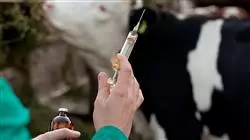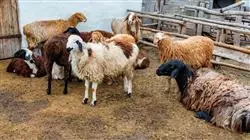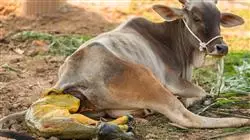University certificate
The world's largest faculty of veterinary medicine”
Why study at TECH?
The approach to one of the groups of diseases that can have the greatest impact on the successful reproduction of ruminants, in a very complete and highly qualified course”

To be able to intervene successfully in ruminant veterinary medicine, it is essential to know the different diagnostic methods and, of course, the most appropriate alternatives for the treatment of the different pathologies. This Postgraduate Certificate will address metabolic disorders together with the endocrinopathies that accompany them.
We will examine the dermatological alterations of cattle and small ruminants, including pathologies that affect the mucocutaneous junctions, some of which are highly contagious among the animals of a farm, such as viral, fungal and parasitic diseases. These constitute the most frequent group of causes of skin alterations, being, in many cases, not only of rapid transmission, but of obligatory reporting in many countries (e.g. vesicular diseases) and with a severe impact on production and even on the market, as they constitute non-tariff barriers for the export of livestock products.
Therefore, knowledge of these diseases is essential for rapid identification and prompt management, including the establishment of appropriate management guidelines.
Finally, it addresses the pathophysiology, diagnosis and treatment of other endocrinopathies and some less frequently occurring metabolic disorders, as well as some congenital diseases affecting the skin and adnexa, and endocrine glands.
The study of diseases caused by nutritional alterations due to inadequate diets, as well as pathologies related to exposure and consumption of toxic substances, play a relevant role in Metabolic, Endocrine and Dermatological Diseases in Ruminants. Toxicology and Neonatology
Essential yet rare specialization for the specialist veterinary clinician that will set you apart as a specialist in this field of work"
This Postgraduate certificate in Metabolic, Endocrine, Dermatological and Toxicological Diseases in Ruminants. Neonatology contains the most complete and up-to-date scientific program on the market. The most important features include:
- The latest technology in Online teaching software
- A highly visual teaching system, supported by graphic and schematic contents that are easy to assimilate and understand
- Practical cases presented by practicing experts
- State-of-the-art interactive video systems
- Teaching supported by telepractice
- Continuous updating and recycling systems
- Autonomous learning: full compatibility with other occupations
- Practical exercises for self-assessment and learning verification
- Support groups and educational synergies: questions to the expert, debate and knowledge forums
- Communication with the teacher and individual reflection work
- Content that is accessible from any fixed or portable device with an Internet connection
- Complementary documentation banks permanently available, even after the course
The clinical, specialized and advanced fundamentals, based on veterinary evidence that will allow you to face the daily intervention in cattle and ruminants”
Our teaching staff is made up of professionals from different fields related to this specialty. In this way, TECH makes sure to offer professionals the up-to-date objective it intends. A multidisciplinary team of professionals skilled and experienced in different environments who will develop theoretical knowledge efficiently, but, above all, will provide students with practical knowledge derived from their teaching experience: one of the differential qualities of this program.
This mastery of the subject matter is complemented by the effectiveness of the methodological design. Developed by a multidisciplinary team of e-Learning experts, it integrates the latest advances in educational technology. In this way, the student will be able to study with comfortable and versatile multimedia tools that will give them the operability they need in their training.
The design of this program is based on Problem-Based Learning: an approach that conceives learning as a highly practical process. To achieve this remotely telepractice will be used: with the help of an innovative system of interactive videos and learning from an expert they will be able to acquire the knowledge as if they were facing the case they are learning at that moment. A concept that will make it possible to integrate learning in a more realistic and permanent way.
With a methodological design based on proven teaching techniques, this innovative program will take you through different teaching approaches to allow you to learn in a dynamic and effective way"

Supported by evidence, the approach of this program will allow you to learn in a contextual way and acquire the skills you will really need in your daily practice"
Syllabus
The contents have been developed by the different experts of this Postgraduate certificate, with a clear purpose: to ensure that our students acquire each and every one of the skills necessary to become true experts in this field.
A complete and well-structured program that will take you to the highest standards of quality and success.

A comprehensive teaching program, structured in well-developed teaching units, oriented toward learning that is compatible with your personal and professional life"
Module 1. Metabolic, Endocrine and Dermatological Diseases in Ruminants. Toxicology and Neonatology
1.1. Bovine Dermatological Disorders
1.1.1. Congenital Dermatological Pathologies
1.1.2. Skin and Hair Diseases
1.1.3. Subcutaneous Diseases
1.1.4. Hoof and Horn Diseases
1.1.5. Cutaneous Neoplasms
1.2. Small Ruminant Dermatological Disorders
1.2.1. Congenital Dermatological Pathologies
1.2.2. Infectious Dermatitis
1.2.3. Vesicular and Mucocutaneous Junction Diseases
1.2.4. Hair and Wool Parasitic Diseases
1.2.5. Caseous Lymphadenitis
1.2.6. Skin and Adnexal Diseases Associated with Toxicity and Nutritional Problems
1.2.7. Cutaneous Neoplasms
1.3. Metabolic and Endocrine Disorders in Bovines
1.3.1. Ketosis
1.3.2. Calcium, Magnesium and Phosphorous Disorders
1.3.3. Other Endocrinopathies
1.4. Metabolic and Endocrine Disorders of Small Ruminants
1.4.1. Pregnancy Toxemia
1.4.2. Stump, Rickets
1.5. Nutritional Deficiencies in Bovines
1.5.1. Introduction
1.5.2. Copper Deficiencies
1.5.3. Selenium and Vitamin E Deficiencies
1.5.4. Cobalt Deficiencies
1.5.5. Iodine Deficiency
1.5.6. Manganese Deficiency
1.5.7. Iron Deficiency
1.5.8. Zinc Deficiency
1.5.9. Main Vitamin Deficiencies
1.6. Nutritional Deficiencies in Small Ruminants
1.6.1. Copper Deficiencies
1.6.1.1. Enzootic Ataxia
1.6.1.2. Bone Alterations
1.6.2. Cobalt Deficiencies
1.6.2.1. Ill-Thrift
1.6.2.2. White Liver Disease
1.6.3. Selenium Deficiencies
1.6.3.1. White Muscle Disease
1.6.4. Vitamin E Deficiency
1.6.5. Iodine Deficiency
1.6.6. Deficiencies in Trace Elements
1.7. Main Intoxications in Ruminants I
1.7.1. Introduction. Overview
1.7.2. General Diagnostic and Therapeutic Guidelines for Intoxications
1.7.3. Intoxications Related to Ingestion of Toxic Plants
1.7.3.1. Neurotoxic
1.7.3.2. Hepatotoxic
1.7.3.3. Nephrotoxic
1.7.3.4. Phototoxic
1.7.3.5. Cardiotoxic
1.7.3.6. Anticoagulants
1.7.3.7. Other Toxic Plants
1.8. Main Intoxications in Ruminants II
1.8.1. Mycotoxins
1.8.2. Feed Additive Intoxications
1.8.2.1. Nitrogen Compounds (Urea)
1.8.2.2. Copper
1.8.2.3. Medication
1.8.3. Environment-Related Intoxications
1.8.3.1. Pesticides
1.8.3.2. Inorganic Elements (Lead, Arsenic, Selenium, Fluorine...)
1.8.3.3. Quality of Drinking Water
1.8.3.3.1. Intoxications by Other Industrial and Commercial Chemical Compounds
1.8.3.3.2. Therapeutic Guide in Ruminant Intoxications
1.9. Main Calf Problems
1.9.1. Congenital Diseases
1.9.2. Trauma and Death During Labor
1.9.3. Prematurity, Dysmaturity and Neonatal Maladjustment
1.9.4. Perinatal Diseases and Problems
1.9.5. Diseases Associated with Reproductive Biotechnologies
1.9.6. Failure of Colostral Immunoglobulins Transfer
1.10. Main Problems of Neonatal Small Ruminants
1.10.1. Congenital Diseases
1.10.2. Prematurity, Dysmaturity and Neonatal Maladjustment
1.10.3. Perinatal Problems
1.10.4. Gastrointestinal Tract Diseases
1.10.5. Locomotor System Diseases
1.10.6. Failure of Colostral Immunoglobulins Transfer

This academic itinerary is exclusive to TECH and you will be able to develop it at your own pace thanks to its 100% online Relearning methodology"
Postgraduate Certificate in Metabolic, Endocrine, Dermatological and Toxicological Diseases in Ruminants. Neonatology
Immerse yourself in the fascinating world of veterinary medicine with our Postgraduate Certificate in Metabolic, Endocrine, Dermatological and Toxicological Diseases in Ruminants: Neonatology at TECH Global University. This program, offered online, is designed for veterinarians and veterinary students who wish to expand their knowledge in the care and treatment of neonatal ruminants. Ruminants, including cattle, sheep and goats, play a vital role in the food industry and agriculture. Understanding the metabolic, endocrine, dermatological and toxicological diseases that can affect neonates of these species is essential to ensure their health and well-being. Our Postgraduate Certificate will provide you with specialized knowledge and practical skills to diagnose, treat and prevent a variety of conditions in neonatal ruminants.
Start building your future by becoming part of the best university
Our online Postgraduate Certificate gives you the flexibility to study at your own pace, from anywhere in the world. With access to high quality educational resources, interactive materials and the guidance of veterinary experts, you can develop an in-depth understanding of the diseases that affect young ruminants and learn the best practices for their management. At TECH Global University, we believe in the importance of quality veterinary education. Our team of expert professionals will guide you as you explore clinical cases, study the latest research in the field, and gain practical skills that will be critical in your professional practice. Upon completion of our Postgraduate Certificate in Metabolic, Endocrine, Dermatologic and Toxicologic Diseases in Ruminants: Neonatology, you will be equipped to face clinical challenges with confidence and provide exceptional care for ruminant neonates. Whether you're interested in private veterinary practice, research or industry, this course will prepare you to excel in your field. Join TECH Global University and transform your passion for veterinary medicine into a successful and rewarding career.







